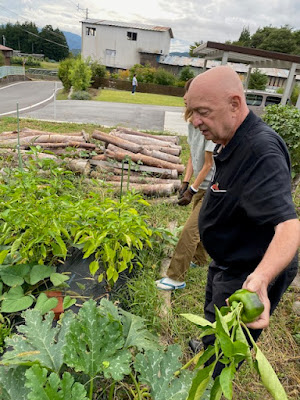Frank Center Lobby dedication to Scott Beard
|
“Full Effort is Full Victory” Billion Success Interview with Kayoko Mitsumatsu
Kayoko was interviewed by  about her journey with Yoga Gives Back.
about her journey with Yoga Gives Back.
As an avid yoga practitioner in Los Angeles, Kayoko founded Yoga Gives Back in 2007 to express her gratitude for the gift of yoga. Inspired by the microfinancing revolution of Nobel Peace Laureate Dr. Muhammad Yunus, Kayoko realized, “for the cost of one class, you can change a life.”
In its 16th year, YGB empowers over 2,400 mothers and children with micro-loans and education funds in India, supported by yoga communities in 30 countries.
Prior to moving to the USA in 1992, Kayoko was a producer/director for NHK Japan’s National Public Broadcaster, working on documentary television programs, and cultural attaché at the Japanese Embassy in London, UK. Her passion for filmmaking is rooted in the perspective gained from living abroad: Australia, Brazil, United Kingdom, and USA.
Kayoko has been filming YGB’s fund recipients in India to share the harsh realities of underserved women and children, as well as the real impact of YGB’s global support.
Please tell us a little bit about your business – what is Yoga Gives Back about?
Yoga Gives Back (YGB) is a Non-Profit Organization based in Los Angeles. Its mission is to mobilize yoga practitioners (physical, spiritual and all) worldwide to channel their gratitude for the practice into empowering India’s women and children to create sustainable lives. In its 16th year, YGB now empowers more than 2400 undeserved women and children in India with micro-loan and education programs, supported by global communities in over 30 countries as well as 150 Ambassadors who are the leaders and teachers.
Tell us a little bit about your background and how you started your company?
I am a documentary filmmaker by profession, working for NHK Japanese National Public Broadcaster for over 30 years since graduating from college in Tokyo. I also became an independent producer for NHK since I moved to Los Angeles in 1992. In 2006, I was producing a documentary program about Social Entrepreneurship here in the US and came to learn about Dr. Muhammad Yunus, Nobel Peace Prize Laureate’s revolutionary microfinancing success in developing countries to alleviate poverty, especially empowering underserved women around the world. At the same time, I was just starting to fall in love with yoga practice at home in Los Angeles with deep appreciation for its profound benefit physically and mentally from my daily practice.
I was 47 and felt the strong inner calling to give back for the benefit I was receiving from this ancient tradition of YOGA from India. I learned that $6 billion was spent on YOGA per year in the US alone, while 75% of the population in India still lives under the poverty line, earning $2 a day. It was so lopsided. I realized that “for the cost of yoga class in the West, you can change a life in India with microfinancing.”
I started sharing this idea with my yoga teacher, studio owner and everyone supported the idea right away, to my surprise. Apparently, many yoga communities were already looking for an opportunity to give back but there was no charity in the yoga community that focused on giving back to India to express our gratitude. This was how Yoga Gives Back was born from a yoga studio in Los Angeles. This movement of gratitude has now spread to 30 countries worldwide, empowering more than 2400 women and children with micro-loan and education programs. Who knew!
What do you think are the top 3 skills needed to be a successful entrepreneur, and why?
- Resilience: Because it takes time and there are ups and downs along the way
- Passion: Because that is your motivation and fuel
- Community: Because you can multiply the impact when you work with a community
What are your plans for the future? How do you plan to grow this company?
Our goal is to reach One Million Yogis to join in our global grassroots campaign. There is an estimate of 300 million people enjoying yoga practice in the world. If just a fraction, one million people, join us we can raise much more funding to empower significantly more lives in India. Out of India’s 1.4 billion people, an estimated 50% or more still live below the poverty line. The pandemic and climate change hit the vulnerable population much harder economically.
We continue to engage our Global Ambassadors and their communities with fundraising efforts as well as engaging more yoga businesses who are making profit from this ancient practice. It takes time, but year after year, we are growing our outreach.
How have the pandemic and Lockdown affected you or your new business?
At Yoga Gives Back, we learned quickly to switch our fundraising events such as The Annual Gala to online event. This actually gave us a great opportunity to grow global community events more effectively than pre-pandemic time, as technology such as ZOOM also became so common and effective to connect us globally. In 2021, we also had a surge of global support while India suffered from the Covid crisis. Therefore, our global online campaign became very effective.
What we have learned now is people are tired of online events and want to go back to in-person classes and events. We are learning how to adjust to this uncertain situation which is beyond our control. It has been very important to get feedback from our supporters in this fluid situation.
How do you separate yourself from your competitors?
We are a nonprofit organization and it is more important to seek collaboration than competition. I am aware that there are many nonprofit organizations within the yoga community with different missions. For Yoga Gives Back, it is important to emphasize that everyone who benefits from this practice wants to join us to give back to India, where yoga is from. We are unique in the community in that our mission is to give back to India, the source of our practice with sheer gratitude. There is no other nonprofit like ours.
What were the top 3 mistakes you made starting your business; what did you learn from them?
I actually cannot think of mistakes. All efforts I put into starting this organization led to the next step, no matter how small or big. I just do not see anything as mistakes that did not follow as my plan or vision. I see them as necessary steps to keep making changes and progress. Of course, there have been many instances like those!
Tell us a bit about your marketing process. What’s been the most successful form of marketing for you?
By far, our YGB FILMS, a series of short films, has been the most powerful marketing tool for us to reach out to our global audience with our mission and message. In 2007 as I prepared for my first trip to India, I was advised to take my video camera by a dear friend, Beth Gallagher, an Emmy Award Winning Documentary Film Editor who helped my professional films in the past. She advised me to start filming this visit to India for Yoga Gives Back. At first, I was reluctant as I have never filmed on my own. I always had a crew of professionals with me when shooting films. But with no budget, I had to do this all by myself for the first time and this was truly the most challenging and the best thing I have done.
Over the last 15 years, I have filmed many fund recipients’ stories, which chronicles how our donors’ contributions have made a real impact in many lives. My filming skills also improved significantly over the years. One best example is Dr. Guruprasad, whom I met in 2007 on my first visit to India. He was 15, could not speak English, and shared his dream to become a doctor to fulfill his mother’s dream. I have filmed his journey for the last 15 years in India until he became an Emergency Doctor a few years ago. There are many short films like this one that shed light upon the life-changing impact of how small donations amount to monumental transformation among more than 2400 vulnerable women, youths and children in India we serve.
I am also very proud and see critical value of this tool as I do not see examples like these films among many nonprofit organizations.
What have been your biggest challenges and how did you overcome them?
The biggest challenge was to accept a salary from Yoga Gives Back. For many years, I worked as a volunteer and felt guilty to be paid for my service for this mission. However, I started talking to many leaders and experts of Non-Profit Organizations and it became very clear to me that YGB has to be financially structured to survive with sustainability, otherwise YGB will collapse and the negative impact to our fund recipients in India is unfathomable. After eight years of dedicated work as a volunteer, finally I became a strong proponent for paid work, and this has enabled me to fully dedicate myself to YGB’s mission which is my life mission now. I no longer work for Public Broadcaster. What was your first business idea and what did you do with it?
Yoga Gives Back is my first business and I have explained above how I did it. I never had any other business in my life! I have never worked for the for-profit sector.
What are you learning now? Why is that important?
I am learning the critical value of taking care of myself. If I am not rested, charged with good positive energy, I cannot put full effort in to this work and continue to have aspirations and innovative energy to make things happen for our mission. Self-care is the most important, our body is our temple to take care of so it can serve others. I have worked so hard in my twenties and thirties to make television programs, and now I realize I was not happy most of the time as I was exhausted most of the time, there was no time for self-care. We want to be happy by doing what we believe in and spend most of our lifetime doing.
If you had a do-over at your business, what would you do differently?
I would not change anything as I do not know the alternatives.
What are the top three online tools and resources you’re currently using to grow your company?
- Network for Good
- Hootsuite
What’s a productivity tip you swear by?
Good sleep, down dog and meditation. This combination will bring great ideas with clarity!
Can you recommend one book, one podcast, and one online course for entrepreneurs?
Book: The Bhagavad Gita by Eknath Easwaran
If you only had $1,000 dollars to start a new business, knowing everything you know now, how would you spend it?
I would use it for cloud fundraising and a social media campaign to grow seed funds.
What helps you stay driven and motivated to keep going in your business?
To stay in touch with our partners in India and our global supporters. Communications and learning the updates from India keeps me inspired with the conviction that our work is making a real impact in so many lives there. To continue dialogue with our global supporters keeps me motivated in our mission as I can see the critical value of our work and campaign connecting global yoga practitioners as one big family who appreciates our platform to give back to India.
What is your favorite quote?
“Satisfaction lies in the effort, not in the attainment, full effort is full victory.”
– Mahatma Gandhi
What valuable advice would you give new entrepreneurs starting out?
Never underestimate your action, no matter how big or small, to change this world to a better place. Action is the only solution.
Who should we interview next and why?
Dr. Kenneth Atchity, Founder of “Story Merchant” to guide everyone to write a story. His life passion is to help writers to achieve their goals as a writer based on his own successful career as a professor, entrepreneur, literary manager and film producer. He has dedicated his life to this mission and the readers can learn so much from his story and message.
OR
Jocelyn Solomon. She is an amazing yoga teacher based in Santa Monica, California and is a real advocate for justice. She also leads sober coaching based on her own experience. She inspires so many students around the world as well as myself as YGB’s Board Member and a human being. She embodies YOGA OFF THE MAT to make this world a better place, starting with your own self first.
What is your definition of success?
Putting full effort every day and not exploiting anybody for our mission.
How do you personally overcome fear?
By taking action.
How can readers get in touch with you?
You can reach me by emailing me at kayoko@yogagivesback.org.
Care, not cuffs, for substance use | OPINION
by Vincent Atchity
It’s no secret there is a significant and growing mental health and substance use crisis in Colorado. Though some are working to address this crisis, there remain entrenched systems, policies and attitudes that harm rather than help the most vulnerable in our communities. Coloradans of all ages experience grievous harm and die prematurely in association not only with their use of alcohol, opioids and other legal and illegal substances, but with the way our community’s systems respond to them and fail to reduce the terrible harms they cause.In order to make real, meaningful change, we need to radically reassess the ways we live with the substances in our world and with the people who use them. We must reorient our efforts and resources toward helping Coloradans with protective education that is fact-based, risk-mitigating and has access to care complete with compassion and cultural competency.
Colorado has one of the highest rates of mental health needs and substance use in the country. At the same time, our state ranks among the worst in the nation when it comes to access to care. As a result, the health needs of many in our state are left unaddressed until they reach a crisis level — leading to homelessness, jail, hospitalization, overdose and other preventable and tragic outcomes. Too often, across the population, harmful substance use leads to premature death.
House Bill 1326, the fentanyl law which passed with bipartisan support last year, is the latest example of the decades-long bipartisan practice of fruitlessly criminalizing people who need compassion and care. We had hoped as a society we were evolving past these practices that have no evidence for their contribution to health or safety, but this new law reversed recent progress and made simple possession of more than a gram of fentanyl a felony. Due to the immense and persistent barriers to housing, employment and education that are tied to a felony conviction, all felony sentences are essentially life sentences and wreak generations of havoc on community ecosystems.
The War on Drugs has failed to bring an end to domestic and international drug traffickers, it has failed to make our communities safer, and it has failed to help those struggling with addiction. What this War on Drugs has succeeded in doing is ruin the lives of Coloradans and their families. Especially those who are most vulnerable to law enforcement practices and those who are too poor to afford attorneys or access to health care to support recovery from harmful use and addiction.
Even with the knowledge a criminalizing approach to a public health issue is ineffective at best and immensely harmful and costly to Coloradans and their families at worst, lawmakers this session are continuing to double down on policies that criminalize people who use drugs. Senate Bill 109 would make it a Class 1 drug felony, punishable by up to 32 years in prison, to sell or share any drug that causes a fatal overdose. While this policy intends to target “kingpin” drug dealers and deter drug sales, evidence from other states with these laws on the books show that they instead target friends and family members of the deceased who are often struggling with substance use themselves.
House Bill 1164, introduced this year, will make the fentanyl law passed last year even more punitive by removing protections for those who unknowingly possess the substance. Many controlled substances are now laced with trace amounts of fentanyl unbeknownst to the user, leaving a huge number of Coloradans vulnerable to unnecessarily harsh criminal penalties that can completely upend their lives.
Colorado must devote its resources and intelligence to reducing the potential harms of the substances available to Coloradans. We must not ignore an accumulation of evidence and perpetuate the previous century’s practices of ruining lives and devastating families and communities, with nothing good, not even a cost-savings, to show for it.
We must reduce the potential harm from substances, disentangle mental health from criminal justice, and set a higher bar for equitable access to health care, support and services. When responding to those who need our help most, we must first do no harm and then, whenever humanly possible, provide care, not cuffs.
Vincent Atchity is president & CEO of Mental Health Colorado. He is an advocate for public health and health equity; has worked statewide and nationally as leader of the Equitas Project to disentangle mental health and criminal justice and promote care not cuffs, and has served on the Colorado Governor’s Behavioral Health Task Force and Behavioral Health Transformational (ARPA) Task Force.


























